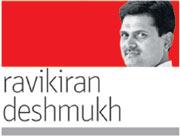Even though so many of the country’s prominent leaders hail from Mumbai, the city has rarely had these leaders fighting at the Centre for its betterment
 Even though so many of the country’s prominent leaders hail from Mumbai, the city has rarely had these leaders fighting at the Centre for its betterment.
Even though so many of the country’s prominent leaders hail from Mumbai, the city has rarely had these leaders fighting at the Centre for its betterment.
ADVERTISEMENT
As the city’s six Lok Sabha constituencies gear up for Lok Sabha polls on April 24, its 1.30 crore citizens finally have a chance to address this oversight.
One hopes that the voters will turn up in droves to express themselves. One also hopes that a larger portion of the city’s populace votes this time than the 43.4 per cent who showed up in the 2009 general elections.
Spread across 437 square kilometers, Mumbai’s railway and air traffic networks operate under the Centre. Use of forested lands and mangroves are subject to provisions under the Environment Protection Act and rules applied on Coastal Regulation Zones (CRZ). Chunks of land used by the defence and the Mumbai Port Trust are with the central government.
Even the responsibility of securing the seacoast lies with the Centre. So in many ways, the Centre is directly accountable to the people of Mumbai. The polls are an opportunity for Mumbaikars to give this Centre a wake-up call.
High up on every Mumbaikar’s list are issues like transport and planned growth. The average Mumbaikar wants to get home faster after work every day, and wants a speedy completion of the projects ongoing in the city that will help him do so.
Before that, he wants the Centre to give clearances and permissions required for pending projects. It would not be wrong to expect someone in Delhi to take issues concerning Mumbai seriously, considering its status as the country’s financial capital.
Roughly, Mumbai’s contribution to the central kitty in 2012-13 was R43,805 crore, with R1.74 lakh crore collected as Income Tax, and R63,000 crore as TDS. Then of course, there is income through the railways, central excise, service tax, and various duties on international trade that are realised through air traffic and ports.
Keeping an eye on the massive proportions of the revenue earned by the government from Mumbai, it is a city that deserves special attention from the central government, especially when it comes to essential services in the city, on which lakhs of its working residents depend.
Take for instance, its poorly managed railway network, where breakdowns and accidents are frequent, claiming the lives of many commuters. This sadly, is the only means of transport available to lakhs of commuters in this city.
A glimpse at important junctions like Dadar, Kurla, Thane, Andheri and Borivali stations during peak hours is sufficient to gauge the sheer chaos and danger involved in traveling by the local trains, which, ironically, are the lifeline of the city.
But the central government doesn’t seem to care. Going through records, one would be shocked to notice just how many times MPs from Mumbai and Thane have sought meetings with the railway minister or senior officials of the railway board, to discuss these issues.
A state booklet, containing issues concerning Mumbai and Maharashtra that that are to be raised by the MPs with the state government, has remained unchanged in size and content over many years. Though the city has received central funds under Jawaharlal Nehru National Urban Renewal Mission (JNNURM), the projects undertaken through it have mostly been delayed, leading to hefty increase in costs.
A number of issues pertaining to the Coastal Regulation Zone (CRZ) and environmental clearance have also been stuck at the Centre. The issue of coastal security is still to be resolved completely, as it involves central departments. The MPs from Mumbai and Thane can form a pressure group and collectively try to resolve issues pending with the Centre.
It is also surprising that MPs from Mumbai spent huge amounts from their local area development funds for construction of toilets, community centres and roads in their localities, when the BMC and state government do the same work. There should be better coordination between these authorities, so that different funds are not spent on similar work.
Today, no efforts are being made to decongest the overcrowded metropolis. Political parties are too scared to speak openly on the issue, fearing a backlash by voters. Instead, they prefer to concentrate on the city’s water, meter and gutter – its water supply, power supply and sewage system.
The writer is Political Editor of mid-day
 Subscribe today by clicking the link and stay updated with the latest news!" Click here!
Subscribe today by clicking the link and stay updated with the latest news!" Click here!






